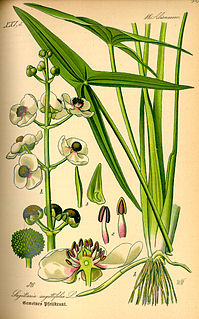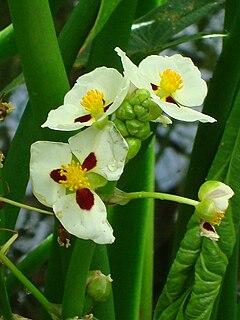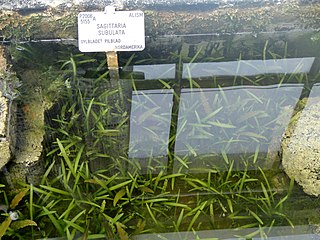
Vallisneria is a genus of freshwater aquatic plant, commonly called eelgrass, tape grass or vallis. The genus is widely distributed in tropical and subtropical regions of Asia, Africa, Europe, and North America.

Sagittaria is a genus of about 30 species of aquatic plants whose members go by a variety of common names, including arrowhead, duck potato, katniss, Omodaka, swamp potato, tule potato, and wapato. Most are native to South, Central, and North America, but there are also some from Europe, Africa, and Asia.

Sagittaria montevidensis is a species of flowering plant in the water-plantain family Alismataceae. Common names include giant arrowhead and California arrowhead.

Sagittaria lancifolia, the bulltongue arrowhead, is a perennial, monocot plant in the family Alismataceae, genus Sagittaria, with herbaceous growth patterns. It is native to the southeastern United States. It is known from every coastal state from Delaware to Texas. The species is also considered native to Mexico, Central America, the West Indies and northern South America. It has become naturalized on the Island of Java in Indonesia.

Sagittaria cuneata is a species of flowering plant in the water plantain family known by the common name arumleaf arrowhead or duck potato. Like some other Sagittaria species, it may be called wapato. It is native to much of North America, including most of Canada as well as the western and northeastern United States.
Sagittaria longiloba is a species of flowering plant in the water plantain family known by the common name longbarb arrowhead and Gregg arrowhead. It is native to the south-central and southwestern United States plus Mexico, Venezuela and Nicaragua. It is also reportedly naturalized in the western Himalayas of India and Bhutan. It grows in slow-moving, stagnant, and ephemeral water bodies such as ponds and small streams, and sometimes disturbed and cultivated habitat such as rice fields and irrigation ditches.

Sagittaria sanfordii is an uncommon species of flowering plant in the water plantain family known by the common names valley arrowhead and Sanford's arrowhead. It is endemic to California, where it is known from a few scattered occurrences on the North Coast and in the Central Valley. Many occurrences previously noted in the Central Valley and in southern California have been extirpated as the plant's aquatic habitat has been lost to human activity.

Sagittaria natans is a species of flowering plant in the water plantain family. It is native to northern Europe and Asia and often cultivated elsewhere as an aquatic ornamental in aquaria and artificial ponds. It is widespread across much of the Russian Federation and reported also from Finland, Sweden, Mongolia, Japan, Korea, Kazakhstan and China.

Sagittaria australis, the Appalachian arrowhead or longbeak arrowhead, is a plant species native to much of the eastern part of the United States, from Louisiana to Iowa to New York State to Florida, mostly between New Jersey and Mississippi with scattered locations elsewhere in the range.

Sagittaria isoetiformis, common name quillwort arrowhead, is an aquatic plant species native to Cuba and to the southeastern United States.
Sagittaria cristata, the crested arrowhead, is a plant species native to Ontario and north-central United States. It grows in shallow water along the edges of lakes, streams and marshes.

Sagittaria teres, the quill-leaved arrowhead or slender arrowhead, is an aquatic plant species of arrowhead native to the northeastern United States: Rhode Island, Massachusetts, New Hampshire, New York and New Jersey.
Sagittaria ambigua, the Kansas arrowhead, is an aquatic plant species native to the central United States. It grows in wet areas, mostly along the shores of ponds and waterways.
Sagittaria brevirostra, common name Midwestern arrowhead or shortbeak arrowhead, is an aquatic plant species native to North America. It is common in wet places in an area stretching from Michigan and Ohio south to Alabama and west to North Dakota, Colorado and northern New Mexico, plus isolated populations in Maryland, New Brunswick, Virginia, Saskatchewan and California.
Sagittaria filiformis, the threadleaf arrowhead, is an aquatic plant species native to the eastern United States, from Maine south to Florida and Alabama. it occurs in flowing streams in the northern part of its range, but more stagnant waters such as marshes and swamps in the South.
Sagittaria engelmanniana is an aquatic plant species native to eastern North America. It has been reported from every state bordering on the Gulf of Mexico or on the Atlantic Ocean from Mississippi to Massachusetts, plus Vermont and Ontario.

Sagittaria graminea, the grassy arrowhead or grass-leaved arrowhead, is an aquatic plant species native to eastern North America. It is known from every Canadian province from Ontario to Newfoundland, and every US state from the Great Plains to the Atlantic, plus Colorado, New Mexico and Cuba. It is considered naturalized in Washington state and in Vietnam.

Sagittaria guayanensis, the Guyanese arrowhead, is an aquatic plant species. It is predominantly tropical, native to Mexico, Central America, the West Indies, and much of South America, as well as West Africa, south and southeast Asia, plus Sudan and Madagascar. It was unknown in the United States until a few populations were reported from Louisiana in 1969.

Sagittaria subulata, the awl-leaf arrowhead, narrow-leaved arrowhead or dwarf sagittaria, is an aquatic plant species that grows primarily in shallow brackish water along the seacoast, in marshes, estuaries, etc. It is native to the Republic of Colombia, the District of Columbia, Venezuela, and every US state along the coast from Massachusetts to Louisiana. It has also been reported as naturalized in Great Britain on just three occasions; only one of these is recent and it appears to have become extinct by 2010. It is also recorded as a non-native on the Azores, and on the Island of Java in Indonesia.

Sagittaria pygmaea, commonly known as the dwarf arrowhead or pygmy arrowhead, is an aquatic plant species. It is native to Japan, Korea, Taiwan, Thailand, Vietnam, Bhutan and China.














